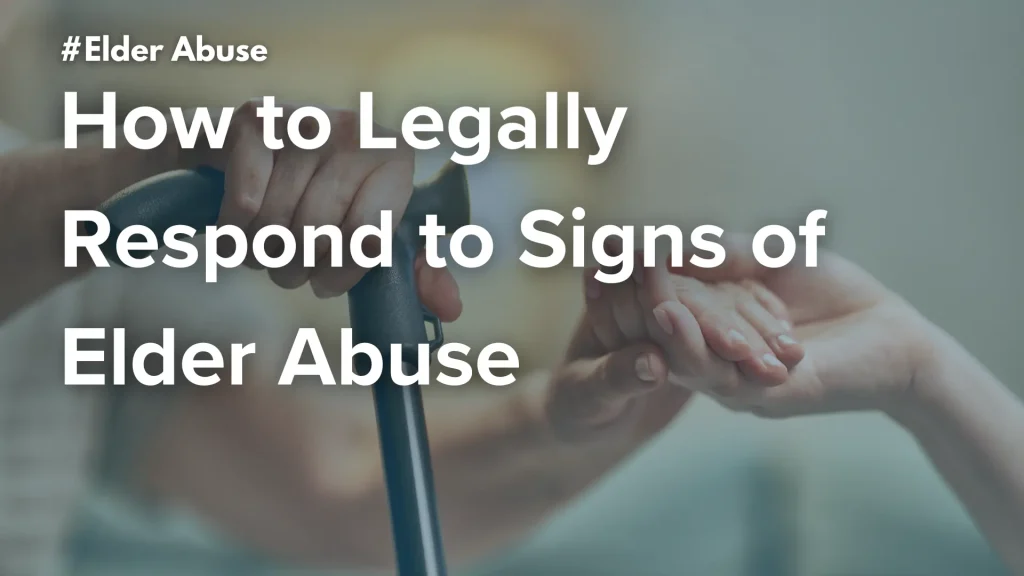
Families with elderly loved ones in care facilities place considerable trust in those facilities and the caregivers they employ. They trust that those parties will do everything possible to protect individuals in their care from suffering harm. When that trust is betrayed, families are justifiably upset and search for answers. If you’re unsure what to do if you suspect elder abuse, start by documenting any warning signs, speaking privately with your loved one, and reporting your concerns.
When you suspect elder abuse, every second matters. Learning how to recognise and report elder abuse could make all the difference in protecting a vulnerable loved one from further harm. Whether the damage is physical, emotional, or financial, it is critical to act quickly. Illinois law protects susceptible adults, but many are unsure where to start. That’s why it’s so important to recognise and report basic elder abuse—learning the signs of neglect, physical harm, or financial exploitation can empower you to take meaningful action.
Knowing the signs, understanding your reporting obligations, and contacting the right professionals can protect a loved one and help hold abusers accountable.
Common Signs of Elder Abuse to Watch For
Elder mistreatment comes in many forms, and not all leave visible bruises. Abuse may be physical, emotional, financial, or a result of neglect. Recognizing the signs early can help you intervene before more serious harm occurs:
- Physical Abuse – Signs of possible elder abuse can include unexplained bruises, burns, or fractures, injuries in different stages of healing, frequent ER visits or hospital stays, and staff members refusing to let visitors spend time alone with the senior.
- Elder Neglect – Neglect may be present if a senior shows signs of poor hygiene, bedsores, or untreated medical needs, along with signs of malnutrition, dehydration, or living in unsafe or unsanitary conditions.
- Emotional Abuse – Emotional abuse may be a factor if a senior suddenly becomes withdrawn or depressed, shows unusual nervousness around particular caregivers, or displays agitation, fear, or confusion that a medical condition can’t explain.
- Financial Exploitation – Financial exploitation could happen if money or valuables go missing, there is unusual activity in bank accounts, sudden changes to wills, deeds, or powers of attorney expire, or if a new “friend” or caregiver suddenly has control over the senior’s finances.
What to Do If You Suspect Elder Abuse
If you are wondering what to do if you suspect elder abuse, your actions can make all the difference. Illinois law provides a framework for reporting abuse, protecting seniors, and preventing elder abuse, whether they live at home or in an assisted living facility. Here are some tips to keep in mind:
- Call 911 If the Situation Is Urgent – Call 911 if the situation is urgent. Emergency response for elder harm should never be delayed.
- File a Report with Adult Protective Services – In Illinois, Adult Protective Services investigates suspected elder abuse, neglect, and exploitation. To report concerns, call the hotline at 1-866-800-1409. Anyone can file a report, but some professionals are legally required.
- Document the Elder Abuse – Include dates, witnesses, photos, and financial records when reporting. Keep copies of everything; strong documentation can support any civil or criminal case.
- Contact the Proper Authorities – If the abuse occurs in a nursing home or assisted living facility, report it to the Illinois Department of Public Health. You may also want to contact a legal professional to explore additional steps.
Taking swift, informed action not only protects your loved one but also holds abusers accountable and helps prevent further harm to other vulnerable adults.
Legal Actions Available for Victims of Elder Abuse

Illinois recognizes that elder abuse, whether in assisted living or by a trusted caregiver, can cause lasting harm and damage. Victims and families have multiple legal paths to protect their rights, seek justice, and prepare for legal situations:
- File a Civil Lawsuit – A civil claim can help recover medical costs, lost assets, and future care needs. Victims may also seek court orders to stop further abuse.
- Press Criminal Charges – When abuse is criminal, authorities may press charges. Families can also request Emergency Orders of Protection to block further contact with the abuser.
- Contact Adult Protective Services (APS) – Illinois APS investigates abuse, neglect, exploitation, and self-neglect. It also helps victims access legal and protective resources.
- Contact an Elder Law Attorney – Attorneys can assist with guardianship, power of attorney disputes, and reversing unauthorized asset transfers.
- Know Your Rights as a Reporter – The Illinois Elder Abuse and Neglect Act shields good-faith reporters with anonymity and legal immunity.
With the proper legal support, families can protect their loved ones, hold abusers accountable, and take steps toward safety and recovery.
Speak with an Illinois Elder Abuse Attorney Today
If you suspect a loved one is suffering from elder mistreatment, do not wait to get help. Our team is here to help you understand your rights and take the first step toward securing the necessary benefits. Contact Peck Ritchey, LLC at (312) 201-0900 to speak with an experienced Chicago elder law attorney in Illinois who understands what your loved one and your family are going through. We can help guide you through every step, from reporting elder abuse to pursuing the legal response your family needs.
Related Post
The Characteristics Of A Qualified Elder Care Litigation Attorney In Chicago
Conservatorship And Elder Law: Chicago Law Firms Can Help You Protect Your Loved Ones
